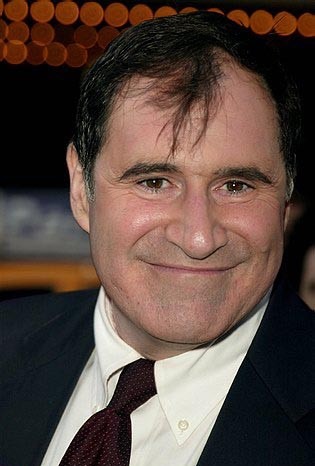
By Danny Peary
Richard Kind is such a prominent and visible figure in the Sag Harbor arts community that it’s a bit surprising that he typically is out here only a couple of weekends a year and even in a good year—when he graces the stage at the Bay Street Theater—his stay is at most only six weeks. It’s disappointing that the multifaceted, one-of-a-kind actor isn’t in a play at Bay Street this summer, but those of us who consider him essential to the season can take comfort that he’ll be making two special appearances. First up, Kind will be the Celebrity Auctioneer at the 24th Annual Summer Gala to benefit the Bay Street Theater at 5:30 pm on Saturday July 11 at Long Warf. Then on August 2, you can find him at Guild Hall in East Hampton, taking on the guise of George Steinbrenner in “Staged Reading: Steinbrenner!,” a play-in-progress about the late despotic owner of the New York Yankees. Moreover, movie fans, you can hear him voice a little girl’s imaginary friend Bing Bong in the animated sensation, "Inside Out." And you can watch him online at https://www.shortoftheweek.com/2015/06/17/cheer/
giving a brilliant performance as a new widower in denial in Michael Slavens’s highly imaginative short, "What Cheer?" Though superbusy, Kind was eager to speak to me last week about his many endeavors.
Danny Peary: Rich, you were born in Trenton, New Jersey, but you had left by the time I attended Trenton High in 1964. [I did go to high school with his cousin Barbara Kind.]
Richard Kind: My father owned LaVake Jewelers on Nassau Street in Princeton. I lived in Trenton until the fourth grade and then my parents, sister Joanne, and I moved to Yardley, Pennsylvania.
DP: I know that when you went to Northwestern it had an excellent film program.
RK: I was not in film or theater, I was pre-law. I didn’t venture at all into the film program, but I probably did more plays at Northwestern than the theater majors.
DP: Did you want to act as a career by this time?
RK: I always wanted to be an actor, but I was supposed to go to law school. But just before I graduated, my dad’s best friend said, “Give acting a chance because you’ll regret it if you don’t when you’re forty.” So I tried and I was good; and one year turned into two and two years into four and that has turned into more years than I want to count.
DP: I didn’t realize that you were in Second City. Was that a goal of yours?
RK: That was not a goal of mine. I just sort of stepped into it. A friend of mine had a theater in Chicago and asked me if I’d like to do a show there. It was an improv theater. I went and did the show and the man who founded Second City liked me and said, ‘Come to my office tomorrow.” That was when people at Second City were leaving to do Saturday Night Live. And he told me to go directly to the Mainstage.
DP: How good were you when you started?
RK: I sucked. I was horrible. I told them that I had never improvised in my life. He just said, “You’ll learn.” And he was right. When you go out in front of 300 people every night doing improv, sooner or later you get it right. And I stayed there for four and a half years.
DP: People know you for such comedic television shows as Mad About You, Spin City, Scrubs,and Curb Your Enthusiasm, but I’m not sure they remember that you had the opportunity to work with Carol Burnett on her short-lived series Carol & Company in the early nineties.
RK: There aren’t enough words to say what a good, professional, and huge-hearted woman Carol Burnett is. She is the most wonderful, gracious, and giving lady. Everybody who works with her loves her. She’s very aware of her fame and how her fans think about her. But she happens to be a lot bawdier than people realize. She can make fun of herself in ways that you wouldn’t think--and it’s very, very funny.
DP: Was being on that show transformative or just another step in your career?
[caption id="attachment_39476" align="alignnone" width="300"]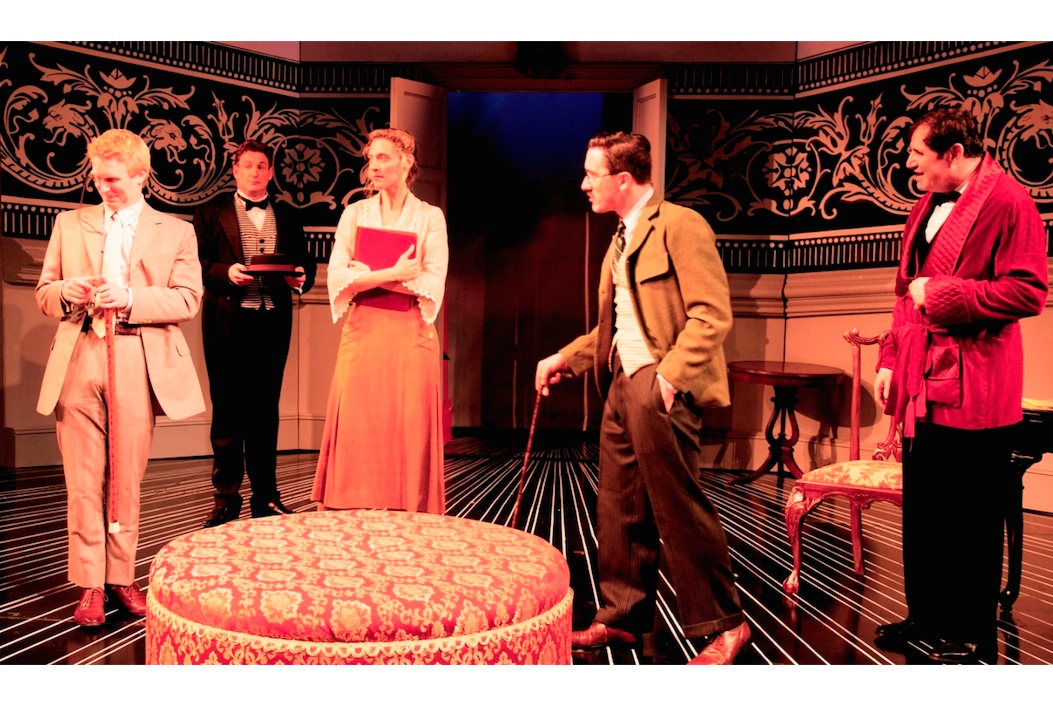 Michael Benz, Aloysius Gigl, Julia Motyka, Carson Elrod and Richard Kind in Travesties at Bay Street Theater. Photo credit: Jerry Lamonica[/caption]
Michael Benz, Aloysius Gigl, Julia Motyka, Carson Elrod and Richard Kind in Travesties at Bay Street Theater. Photo credit: Jerry Lamonica[/caption]
RK: They’re all transformative and they’re all just another gig. I can list other things that were more transformative: Being in Second City was transformative. I did "The Producers" on Broadway and I did it at the Hollywood Bowl—that was transformative. I did a TV show called "Luck" written by David Milch, and that was transformative. "Travesties" was more transformative. I got a lot of them. Can I be honest? I’ve been very lucky in my career. I don’t think I’ve ever had a job that I didn’t like.
DP: You mentioned Tom Stoppard’s play "Travesties," which was the last of several shows you’ve done at the Bay Street Theater. I’m sure everyone who saw it remembers being stunned that you were able to do, without a glitch, that long, crazy monologue that had words, words, and more words.
RK: Oh, my god, that was the toughest thing I did in my life! It almost killed me. Every night I did it and I was stunned myself that I got through it. But I loved it! I love the play and I’m proud that we did it, but a lot of times, sixty percent of the audience would leave at intermission. And I didn’t necessarily blame them. They seemed to enjoy what they saw but it’s a tough play to watch after a day of lying on the beach or being on a golf course. I wouldn’t necessarily choose "Travesties" to do at the theater because maybe it’s too much for the audience.
DP: As you know Princeton has the McCarter Theatre and New Hope has the Bucks County Playhouse. I wonder if growing up around such wonderful small-town theaters and going to theater in general led to your having such an affinity for the Bay Street Theatre.
RK: I did go to the theater a lot growing up in Pennsylvania. But I did only one play in high school drama competition at the Playhouse and never played at McCarter Theatre, but I saw and loved many, many shows at both theaters. I think Bay Street Theater is a gem on the ocean. I think it’s an astounding theater. It’s just a perfect place. It has the right number of seats, it is intimate, and I love what they do and stand for. It’s not summer stock, it’s summer theater. They do classy plays that entertain and challenge and that’s the kind of theater that I like to go see. Not that I don’t like "Hello, Dolly!" and "Mame" and all the other Broadway musicals but this is entertainment for adults. Of course, it’s very difficult to run this theater when people would rather go to the movies or sit on the beach and drink margaritas. People don’t mind spending $150, even $300, to go to New York and see Broadway plays when they could see a great play at Bay Street with the same actors for $70. What a bargain! People don’t believe me but it does get Broadway-caliber actors and shows in an off-Broadway setting for cheaper than what off-Broadway costs. I don’t understand why more people don’t take advantage of the greatness that is right next door. We’re not asking them to go to the dentist and have a tooth pulled. I can understand why "Travesties" would be difficult but the plays are always entertaining. I hear "Five Presidents" [which is playing through July 26] is great; and of course "Grey Gardens" is a tremendous play. [It is with Betty Buckley, a Broadway star.]
DP: Because the theater isn’t always packed, I am sure you think there is special need for people to attend the annual gala on Saturday July 11.
RK: I do the gala every year because I’m on the board for the theater. This year I’m going to be the auctioneer, and I will just try to get us as much revenue as I can. Bay Street Theatre needs any help it can get. A lot of the auction items are fantastic, so I urge everyone to come to the gala and if you have deep pockets, reach into them and buy an item. And the entertainment should be great. I’m huge fan of the town and the people in it, so I hope everyone comes. It’s a really a nice and fun community night.
[caption id="attachment_39474" align="alignnone" width="534"]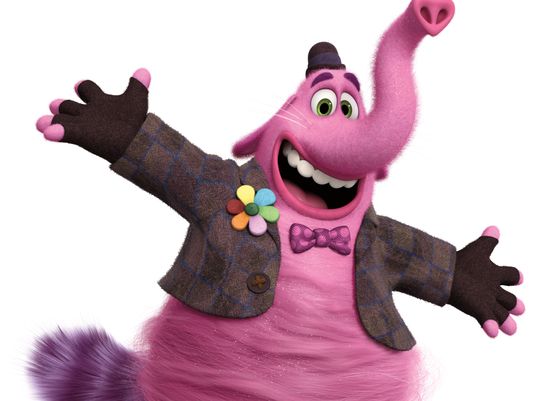 Bing Bong from "Inside Out," voiced by Richard Kind.[/caption]
Bing Bong from "Inside Out," voiced by Richard Kind.[/caption]
DP: I’m sure many people in town have seen "Inside Out," your fifth movie with Pixar doing voices. Do you get fan mail from kids?
RK: I can’t say I get a lot of fan mail. Because kids can’t separate an actor from the voice. I’m not necessarily “Richard Kind as Bing Bong”; I am Bing Bong.
DP: Did you read the whole script or just your part as Riley’s imaginary childhood friend?
RK: I did read the entire script. I should say there were a lot of different scripts and many changes were made. For instance, it was initially Joy and Fear who were going to be Riley’s chief emotions, it turned out to be Joy and Sadness. I could tell you other things but I don’t want to be a Spoiler! Even after reading the script my imagination couldn’t do justice to what I saw when I saw the movie. I think Inside Out is a masterpiece. I say I’m just riding the coattails of Pete Docter, who is a genius.
DP: Were you interested in the concept of the imaginary friend?
RK: Yes, but I must tell you that I didn’t feel like an imaginary friend. I just felt like a friend who happened to look like Bing Bong did. I wish I could say that I put myself into the body of Bing Bong, but I didn’t. I just knew what the essence of Bing Bong was and asked how I could help Joy help Riley.
DP: Inside Out is so popular and everyone feels so emotional about Bing Bong that I would think this role in this movie will be something big for you.
RK: Remember, not everybody realizes I do the voice of Bing Bong. Nobody sees me. But I hope people will come hear me in it because I really love the movie. Every adult will love it and if you have children, you will really love it. You should see it before you write up this interview!
DP: I must ask you about "What Cheer?," an award-winning 17-minute short you made for Michael Slavens. Intriguingly, your song-writing character Stan is in denial after his wife dies and is followed through the streets of Manhattan and into his bed by a marching band. Michael, who directed and co-wrote it with Matthew E. Goldenberg, told me he is a golf and poker buddy of yours.
RK: That’s right. Michael is a great guy and great filmmaker and both he and his movie deserve the attention.
DP: He says there was a huge change from the first time he told you about his idea to when he gave you the finished script. Originally, Stan was dealing only with a girlfriend breaking up with him. In the script you saw, Stan was dealing with the loss of his beloved wife. How did you react to the change?
RK: Hold on! I didn’t see the change. I got the finished script and that’s what I acted.
DP: He told me that he presented the original idea to you on the golf course.
RK: I probably wasn’t listening.
DP: Ha! When you read the script, did you say, “This is something I really want to play?”
RK: Nope. I said Michael Slavens is my friend and I will do him a favor. He will be taking up a week of my summer, taking me away from my kids, and I wasn’t thrilled about it--but he was my friend and I knew it was important to him, so I did it. And now let me say that I think the movie is sensational. And I know that Michael is a fabulous filmmaker. I did think the idea of the story was really pretty cool. It was funny and imaginative. A punk marching band following him around? That’s crazy. I happen to like movies like this that aren’t spoon-fed. I liked the idea of this band that keeps following him around, representing the sublimation of his sorrow. How funny it is to put the band in the role of reminding him of his sorrow and he can’t shake it. And that’s what sorrow is. You can’t shake sorrow, but Stan won’t even accept that he has sorrow. I thought that was clever. Michael’s movie-making and direction was superior to what was in my mind when I read the script and when we were shooting it. He is more imaginative than I am and I thought he did a great job. And the band, the What Cheer? Brigade, is amazing. [The “radical marching band” from Providence, R.I. is celebrating its 10th anniversary in 2015.]
[caption id="attachment_39472" align="alignnone" width="300"]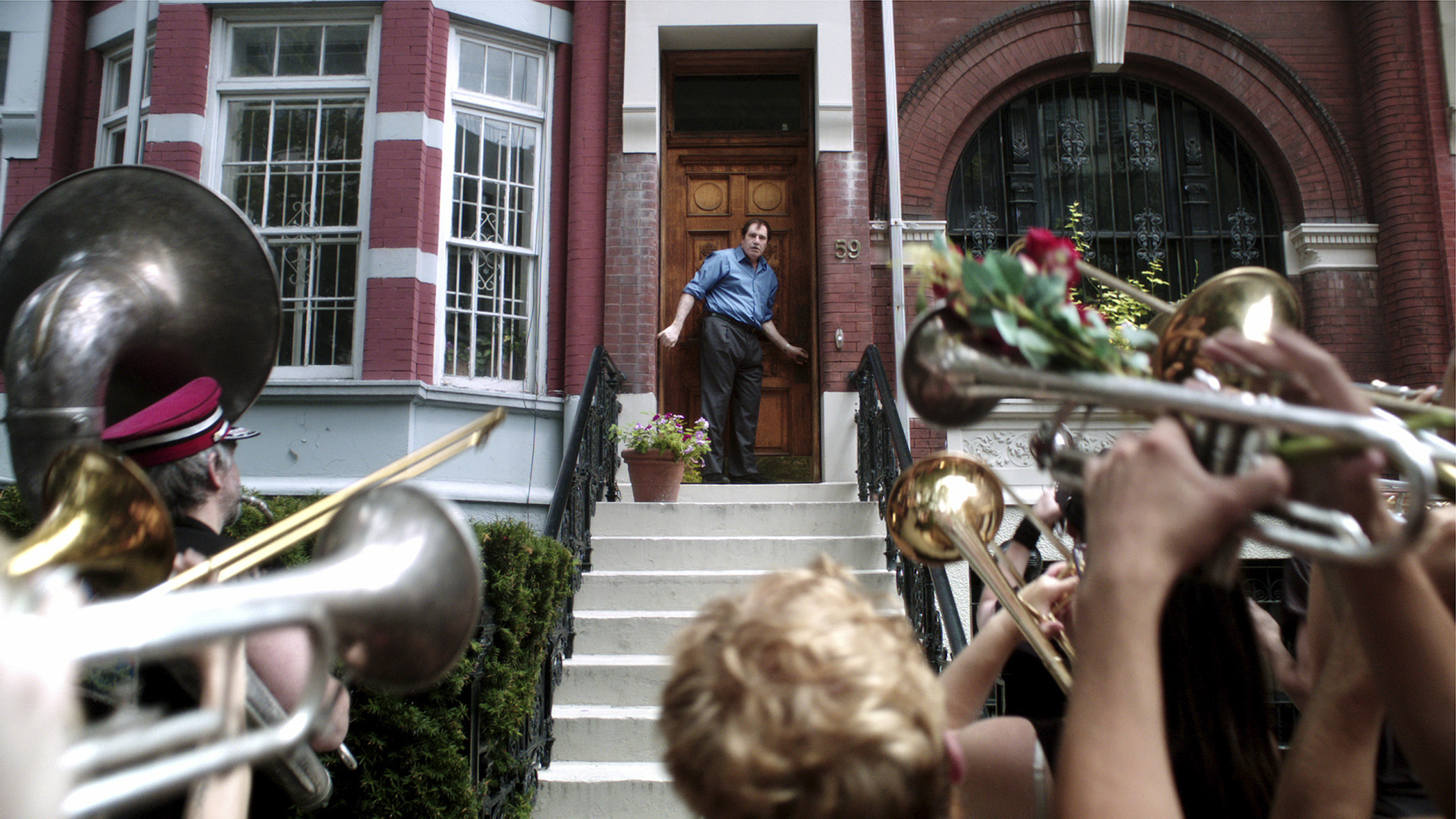 Richard Kind in "What Cheer?"[/caption]
Richard Kind in "What Cheer?"[/caption]
DP: I asked Michael how he thinks you the contributed to the character and he said, “His instincts were filled with just the right balance of comedy and pain. He never played it too big. I almost always used his first take as his instincts were spot on.” Were you thinking, “I can’t play this too big”?
RK: Not really. I treated it realistically. I told Michael, as I tell every director, that my instincts are to go big so to make sure I don’t go too big. I just wanted to keep it in check.
DP: You acted with John Malkovich in a play years ago, and I once asked him if directors were intimidated directing him because they might think everything he was thinking about his character was correct. Does that happen with you? Are directors ever afraid to direct you because they assume you have it right?
RK: I can be pretty tough sometimes. You have to prove to me that you’re a good director and are smarter than me. When I work, I do my homework and I’ve made decisions before I come to the set. However, I adore a good, strong director. When I did Travesties at Bay Street, I couldn’t have interpreted a comma unless I had Gregory Boyd as my director. When I work with idiots, I become pretty tough. But I knew Michael was smart and had something specific in mind and he was invariably right. If I said something to him, we would talk about it and he would justify his opinion. I would, by the way, be intimidated to direct John Malkovich, too. Everything I’ve seen him do has been perfect. The guy tells the truth all the time and he’s way out there.
DP: We talked before how you learned all the words in "Travesties," but while "What Cheer?" has words at the beginning and then almost none.
[caption id="attachment_39470" align="alignnone" width="300"]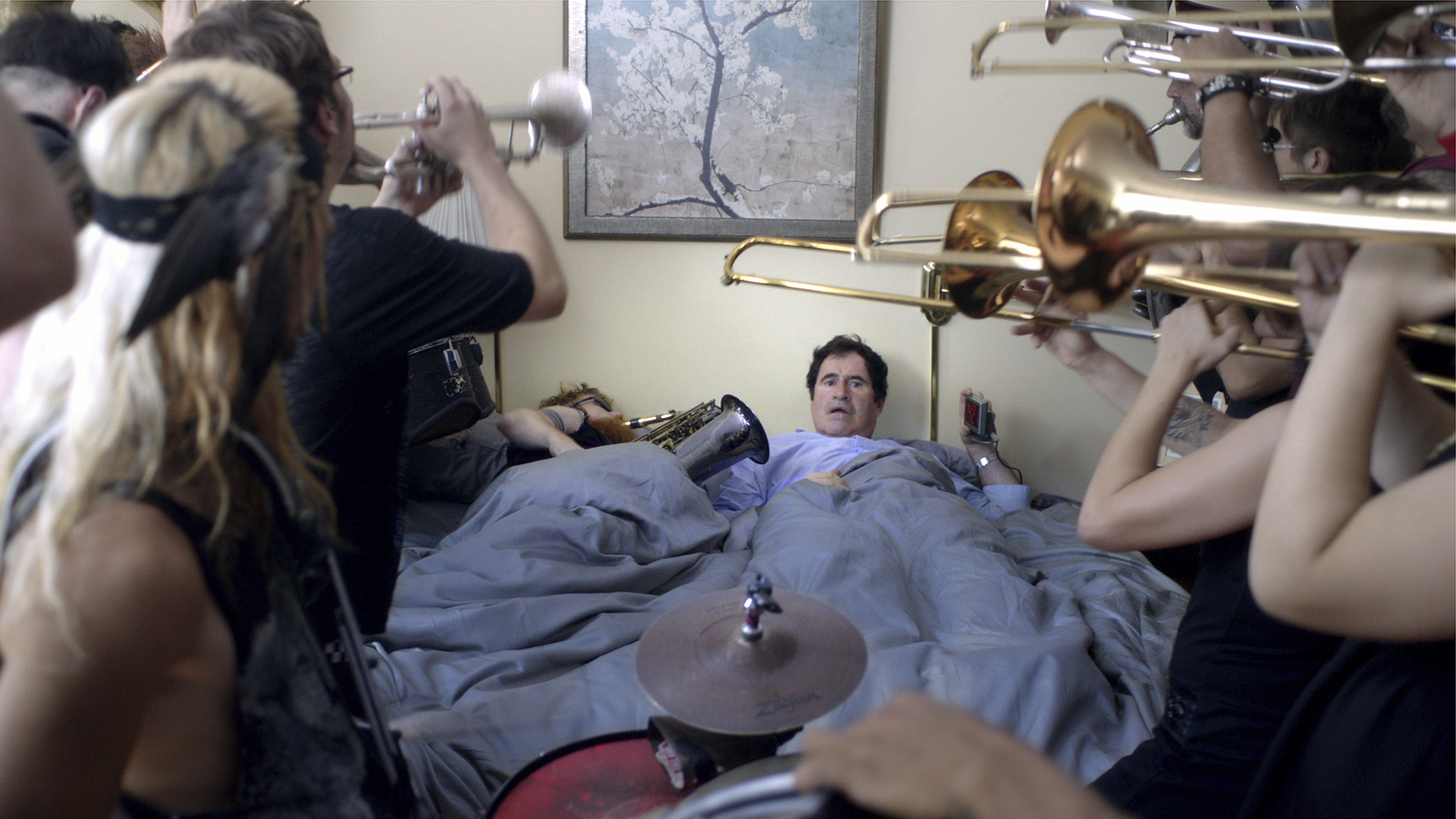 Richard Kind in "What Cheer?"[/caption]
Richard Kind in "What Cheer?"[/caption]
RK: Yep. I find it much more difficult when you don’t have words to say. Then you have to tell everything with your face and you have no back-up. So you can look a little silly sometimes. I have to admit it was tough.
DP: I asked Michael, “Do both of you want us as viewers to go deep into Stan’s head or just watch him curiously from the outside?” He said, “I hope the viewer is thrust into his head as soon as the sousaphone starts playing at his wife’s funeral. For me, grief and anxiety is overwhelming and transports you into an alternate universe.”
RK: I don’t agree with that but that’s his vision and other people may have it, too. I don’t think viewers go into Stan’s head but analyze themselves. They don’t go into his head but into his shoes. To me, the film is a character study of a man who is not dealing with his reality. Actually, that’s very similar to what Riley experiences in Inside Out. I’m not kidding. It’s about how to come to terms with grief. People do it in different ways , and I’ve even seen people at a funeral start making jokes. Stan cannot deal with the grief, but once he does, life and the grief came easier.
DP: Do you think of "What Cheer?" at all as a comedy, maybe like one of W.C. Fields’ aggravation comedies?
RK: I think it’s a comedy about tragedy.
DP: I know you believe you only act what’s on the page, but Michael told me that when he was running over budget and out of time that you figured out how to help him. He says you added so much to what he had written, including using a glance to “replace a page and a half of action.” He said that glance “still makes me choke up.”
RK: Oh, good! That’s so nice to hear.
DP: Finally, tell me about the “Staged Reading” at Guild Hall on August 2 of the play "Steinbrenner!"
RK: It’s one night only. It’s a reading with me and about twelve others of a play with about twenty-four characters. I ain’t learning nothing--I’m just reading it! As you know, writing is rewriting, and that’s what the writers are doing
DP: It’s written by famed sportswriters Ira Berkow and Bill Madden, who did the best-selling biography on Steinbrenner. How did Madden think of you for George Steinbrenner?
RK: I’d love to hear his answer to that question. It was a surprise to me. I don’t think of myself as George Steinbrenner. I guess they think I have the essence of Steinbrenner and if these guys think I’m right for the job, who am I to complain?
DP: Guild Hall’s write-up says, “The play captures the heart, soul, and essence of George Steinbrenner.” I know Steinbrenner could be sentimental but did he have a heart and did he have a soul, in your opinion?
RK: He showed it only on certain occasions. I believe he kept it under a rock but when he brought it out, I believe he was quite benevolent and had a soft side that was quite shocking. He was mercurial and larger than life so when you saw that side it was in an outsized way. I think these guys captured that.
DP: I wouldn’t think they thought you had the same essence but felt you could find the essence of George Steinbrenner.
RK: We all have our ideas of what Steinbrenner was and these guys guy are presenting what they knew about him. So I want to be true to the page, rather than what I feel about Steinbrenner.
DP: Have you done readings already?
RK: Yes, I’ve done a few. As you know, writing is really just rewriting and that’s what they’re doing. I haven’t liked plays about sports figures on Broadway, like the one on Vince Lombardi. I can’t guarantee anything about "Steinbrenner!" because the script is a work-in-progress and we’re doing it as a reading. But I’m hoping that this is a really good play. I hope people come see it.
Danny Peary writes weekly interviews with actors, directors and screenwriters at sagharborexpress.com under "Danny Peary on Film."